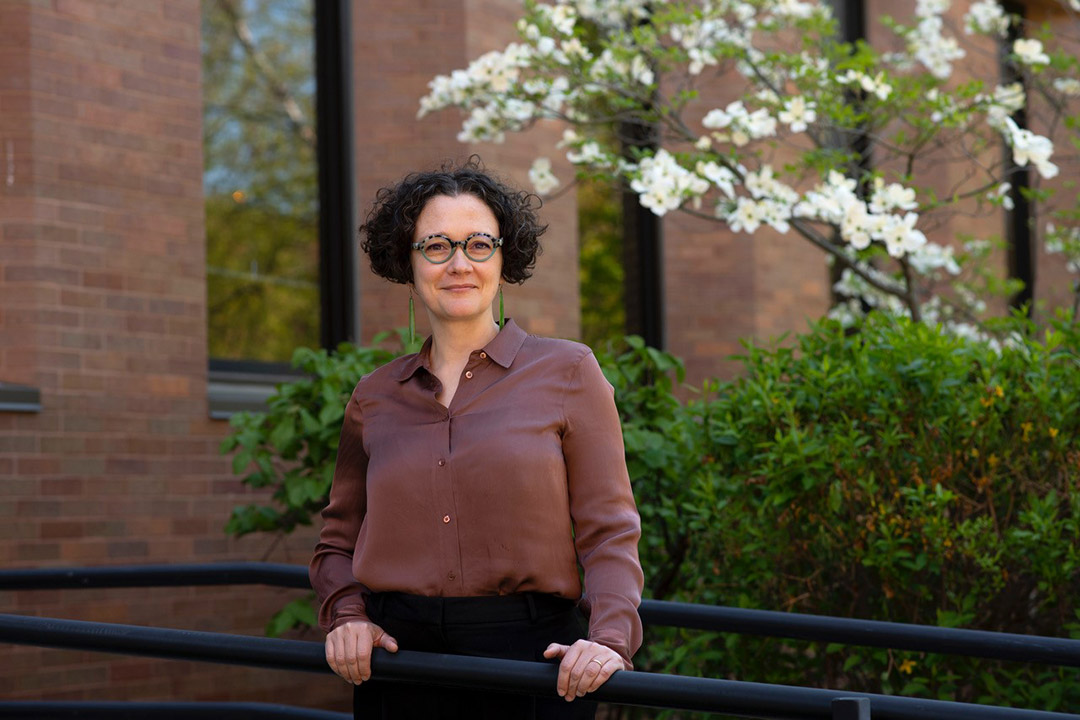Jessica Hardin teaches students to value their ideas and take chances
Anthropology assistant professor earns Provost’s Award for Excellence in Teaching
A. Sue Weisler
Jessica Hardin, Assistant Professor in the Department of Sociology and Anthropology, will receive the Provost’s Award for Excellence in Teaching this year.
Jessica Hardin strives to give her students the empowering experience she felt when she was in college. She sees university life as a unique opportunity to dedicate time to sharing and discussing ideas, and she works to foster an environment where all of the students in her sociology and anthropology classes can recognize the value of their ideas and their ability to meaningfully contribute.
This year, Hardin’s efforts toward helping all students feel successful has earned her the Provost’s Award for Excellence in Teaching. RIT presents this annual award to a faculty member who has spent less than three years as full-time tenure-track and who has demonstrated exemplary teaching methods and contributions to student development.
Eisenhart Awards
Meet this year's recipients of the Eisenhart Award for Outstanding Teaching, RIT’s highest honor for tenured faculty:
- Jan van Aardt, professor in RIT’s Chester F. Carlson Center for Imaging Science
- Abdullah al Faruque, associate professor in RIT’s College of Engineering Technology
“Dr. Jessica Hardin is a stellar educator and teacher,” said Uli Linke, chair of the Department of Sociology and Anthropology. “Her innovative engagement with students, her refreshing approach to learning as a dynamic collaboration between faculty-instructor and course participants, and her creative ability to incite student interest as a scholar-teacher are truly exceptional characteristics evident in Dr. Hardin’s teaching performance.”
Student development is Hardin’s greatest priority. While the content of her classes focuses on examining social and systemic inequalities, she uses this content to help students grow their learning skills and confidence. “I don't care if anyone becomes an anthropologist — what I care about is creating spaces that allow students to think critically.”
Hardin’s classes are often discussion based, but she recognizes that students may struggle with this concept. She employs a variety of strategies to ensure that all of her students have the ability to succeed. She assigns different sets of students to fill the three roles of summarizer, questioner, and note-taker. Hardin explains that these roles help students see the many ways to contribute to a discussion.
“The discussion model privileges certain kinds of personalities, and that doesn't always reflect the complexity of what's happening in a given person’s mind,” Hardin said. So, she provides booklets for her students to write in which only she will read. “At the end of every class, they have a little brief reflection. It’s a way for those students who don’t feel comfortable talking in class to stay in touch with me and know that they are contributing, and they can feel confident that I see them, too.”
Feedback from students is also integral to Hardin’s teaching. She values the end-of-semester student evaluation surveys administered by the school but also surveys her students mid-semester. Based on the feedback she receives, she may change the structure of the class significantly to fit the needs of that specific group of students better. “It’s humbling to do this in front of students, and that’s challenging as an instructor. But it’s also an opportunity to model collaborative leadership,” she said. “What I like about teaching is that it’s a craft that I’m constantly tweaking and changing and adapting.”
Hardin’s own college experience has reinforced her ability to empathize with her students and value their opinions. As a commuter student who worked throughout college, she shares that connection to students who also may feel that they have an atypical college experience. But, encouraging comments from professors during her time also bolstered Hardin’s confidence in the importance of her ideas — a feeling she aspires to provide for her own students.
Hardin says this flexibility and empathy became especially essential during the COVID-19 pandemic. “COVID has taught me to understand that students’ lives are just as complex and challenging as my own life.” She explains that this lesson of flexibility has made her a better teacher, and that she now recognizes how more responsive policies, like no-questions asked deadline extensions, which encourages students’ self-advocacy and accountability without harsh, punitive consequences.
Hardin’s dedication to uplifting her students shines through as the core of her teaching style. Above all, she says that she aims to develop an environment where students can grow. “I co-create these conditions with students where they can try out their own kind of courageousness and take chances, not just with their thinking and ideas, but in their lives.”









